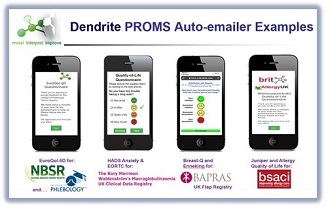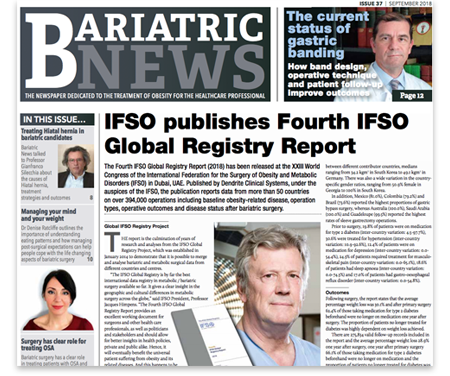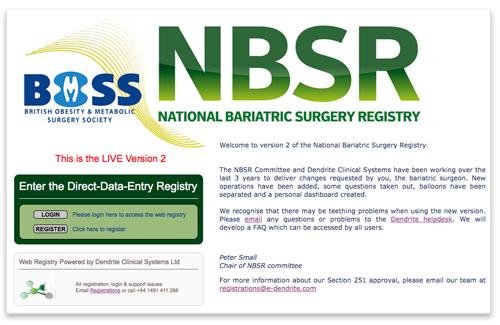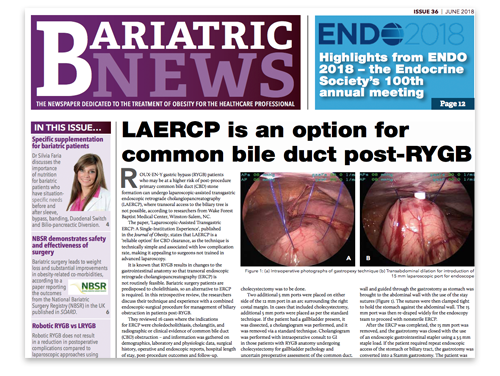 “I am very pleased to report that demand for the Dendrite Web-Registry platform has reached an all-time high” Dr Peter Walton, Managing Director of Dendrite Clinical System. “We’re receiving new orders for new national and international registries every few days now – for surgical registries, medical registries, rare disease registries, medical device registries and Coronavirus Registries (for a range of Community, National, International and Global Covid-19 Registries).”
“I am very pleased to report that demand for the Dendrite Web-Registry platform has reached an all-time high” Dr Peter Walton, Managing Director of Dendrite Clinical System. “We’re receiving new orders for new national and international registries every few days now – for surgical registries, medical registries, rare disease registries, medical device registries and Coronavirus Registries (for a range of Community, National, International and Global Covid-19 Registries).”
“Over 90% of our new web-registry orders include our innovative e-PROMS module that enables patients to enter data into registries remotely”. The automated e-PROMS module can automatically send (at designated time intervals) a secure personalised message to appropriately consented patients and they can complete a PROMS questionnaire on their smart-phones, iPads or computers anywhere in the world (provided they have Internet access) and when completed, the data returns automatically to the registry.
“We have instituted over 35 different PROMS instruments ranging from generic outcome Euroqol EQ-5D type questionnaires, to a very wide range of disease or treatment specific PROMS instruments such as the Breast Q for breast reconstruction with DIEP/SIEA flap, the Atrial Fibrillation Severity Score and the Multiple Sclerosis Quality of Life MSQoL-54 questionnaire,” Dr Walton added. “A great benefit of our e-PROMS module is that essentially the patient is doing the work of data collection and the data just streams in. The e-PROMS module is guaranteed to provide safe and secure patient data collection, and we look forward to working with all our current and future customers to help them develop and expand PROMS data collection.”
Patient Reported Outcome Measures (PROMs) are standardised, validated instruments or questionnaires that are completed by patients to measure their perception of their functional well-being and health status, and patients rate their health by scoring the severity or difficulty in completing certain tasks or routine activities. Dendrite’s flexible innovative e-PROMS module can be adapted include bespoke instruments across the whole spectrum of clinical scenarios, whilst maintaining patient anonymity and confidentiality, ensuring data validation, increasing efficiency and simplifying the data collection process).
 Dendrite Clinical Systems, the publisher of Bariatric News, is pleased to announce issue 37 of the newspaper is now available to view/download. The newspaper reports on research, technology, events and policy in the bariatric specialty, the latest clinical studies, policy changes and product news, the latest meetings and events, interviews prominent bariatric experts, and host debates between specialists on controversial topics.
Dendrite Clinical Systems, the publisher of Bariatric News, is pleased to announce issue 37 of the newspaper is now available to view/download. The newspaper reports on research, technology, events and policy in the bariatric specialty, the latest clinical studies, policy changes and product news, the latest meetings and events, interviews prominent bariatric experts, and host debates between specialists on controversial topics. Dendrite Clinical Systems has received an order to extend the clinical database system and install its new Data Analysis System at the Al Babtain Hospital, Dammam, Saudi Arabia. Dendrite’s unique clinical database system includes four types of analytics and reports:
Dendrite Clinical Systems has received an order to extend the clinical database system and install its new Data Analysis System at the Al Babtain Hospital, Dammam, Saudi Arabia. Dendrite’s unique clinical database system includes four types of analytics and reports: The positive outcomes from the UK-ROPE (Registry of prostate embolization) – a collaboration initiated by British Society of Interventional Radiology (BSIR) and Dendrite Clinical Systems – has resulted in a National Institute of Health and Care Excellence (NICE) recommendation that prostate artery embolization (PAE) should be made available by the NHS.
The positive outcomes from the UK-ROPE (Registry of prostate embolization) – a collaboration initiated by British Society of Interventional Radiology (BSIR) and Dendrite Clinical Systems – has resulted in a National Institute of Health and Care Excellence (NICE) recommendation that prostate artery embolization (PAE) should be made available by the NHS. Dendrite Clinical Systems and the British Obesity & Metabolic Surgery Society (BOMSS) have launched Version 2 of the National Bariatric Surgical Registry, which includes several enhancements and changes improving the data collected and reporting.
Dendrite Clinical Systems and the British Obesity & Metabolic Surgery Society (BOMSS) have launched Version 2 of the National Bariatric Surgical Registry, which includes several enhancements and changes improving the data collected and reporting. Dendrite Clinical Systems, the publisher of Bariatric News, is pleased to announce issue 36 of the newspaper is now available to view/download. The newspaper reports on research, technology, events and policy in the bariatric specialty, the latest clinical studies, policy changes and product news, the latest meetings and events, interviews prominent bariatric experts, and host debates between specialists on controversial topics.
Dendrite Clinical Systems, the publisher of Bariatric News, is pleased to announce issue 36 of the newspaper is now available to view/download. The newspaper reports on research, technology, events and policy in the bariatric specialty, the latest clinical studies, policy changes and product news, the latest meetings and events, interviews prominent bariatric experts, and host debates between specialists on controversial topics. Dendrite Clinical Systems has received an order from NHS Wales to expand the successful Regional Lung Cancer Registry in North Wales to cover the whole of the country, established the Welsh National Lung Cancer Pleural Nodules Registry. The registry is designed for health professionals to collect, view and use real-time data about their patients with pleural disease.
Dendrite Clinical Systems has received an order from NHS Wales to expand the successful Regional Lung Cancer Registry in North Wales to cover the whole of the country, established the Welsh National Lung Cancer Pleural Nodules Registry. The registry is designed for health professionals to collect, view and use real-time data about their patients with pleural disease.


